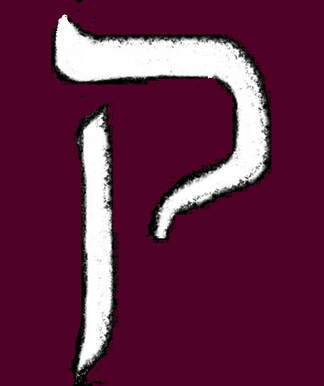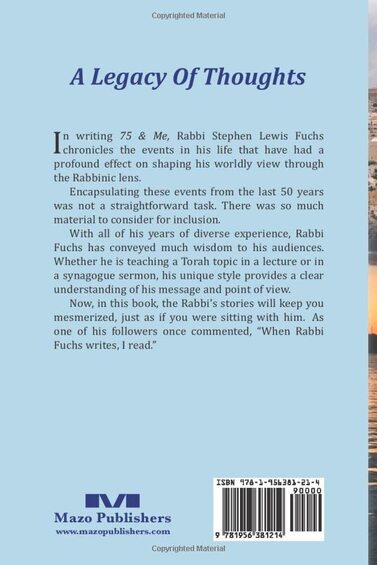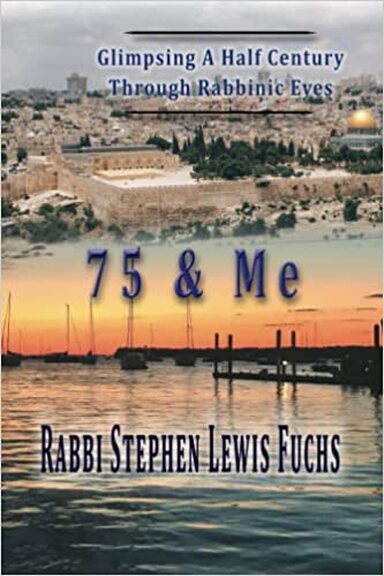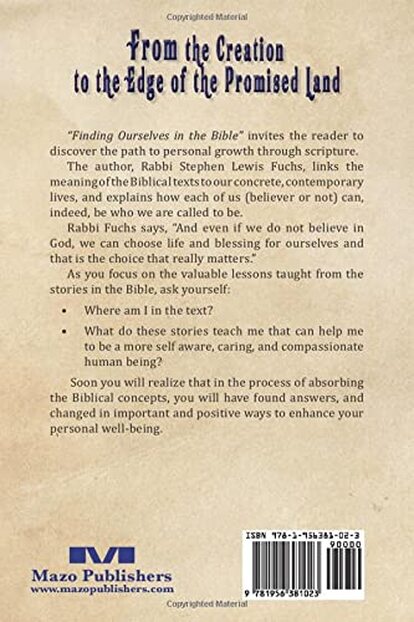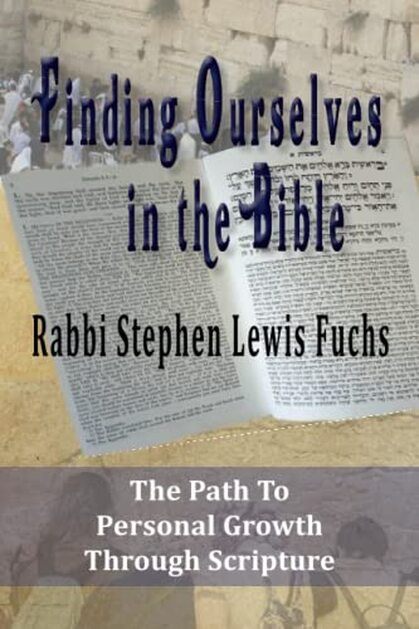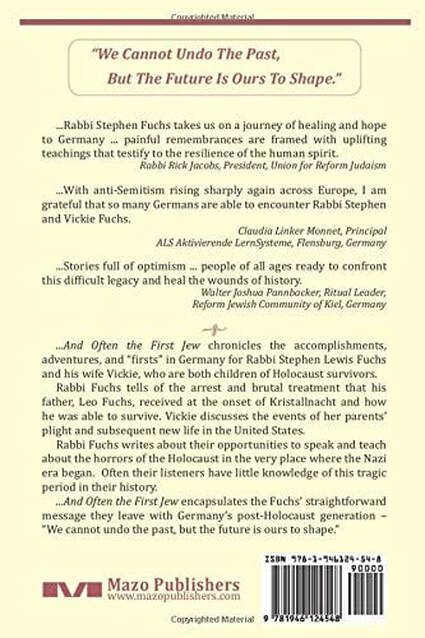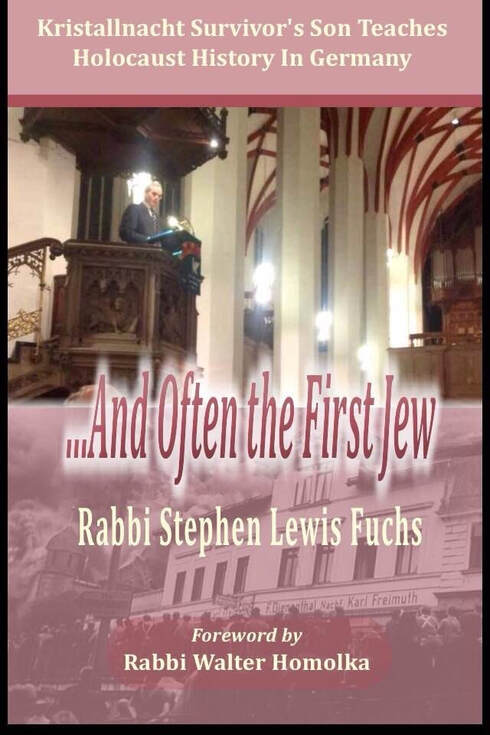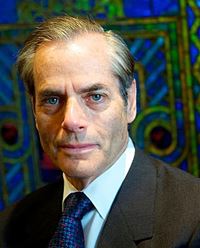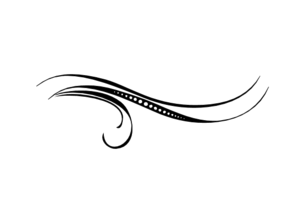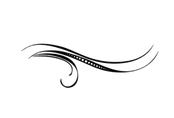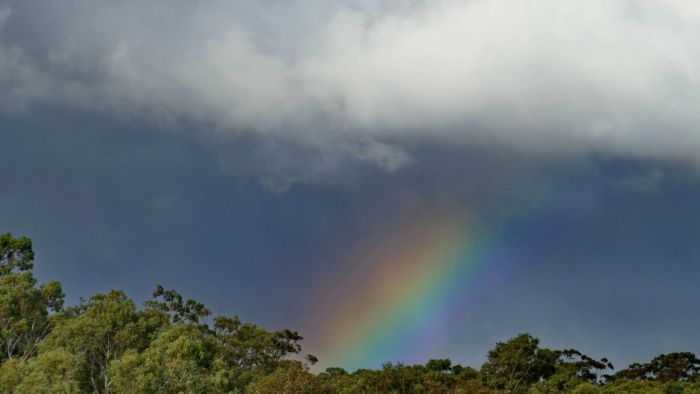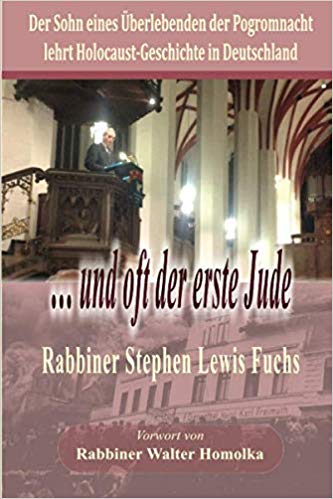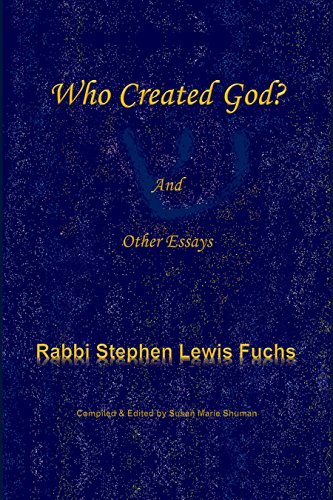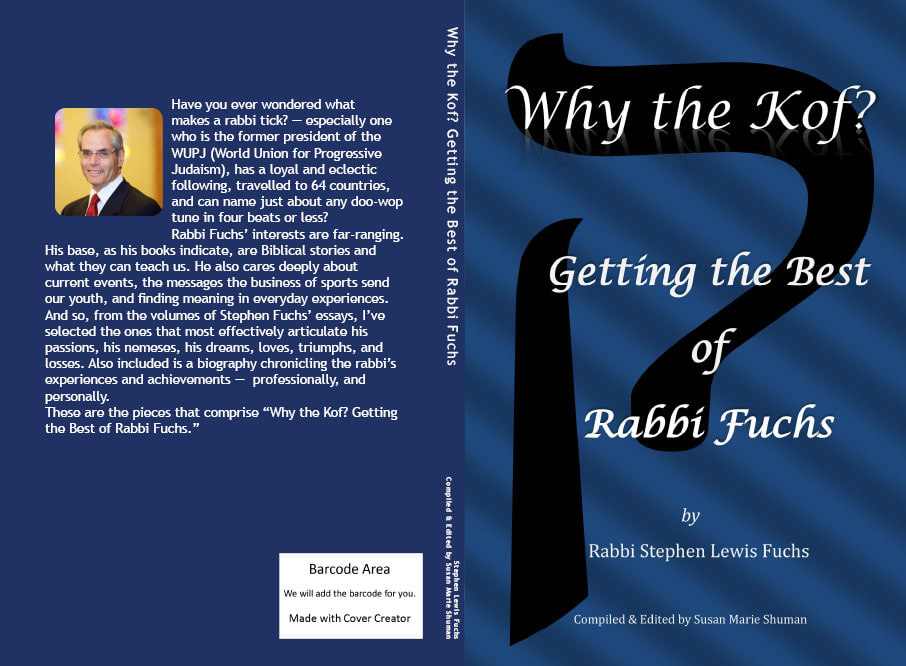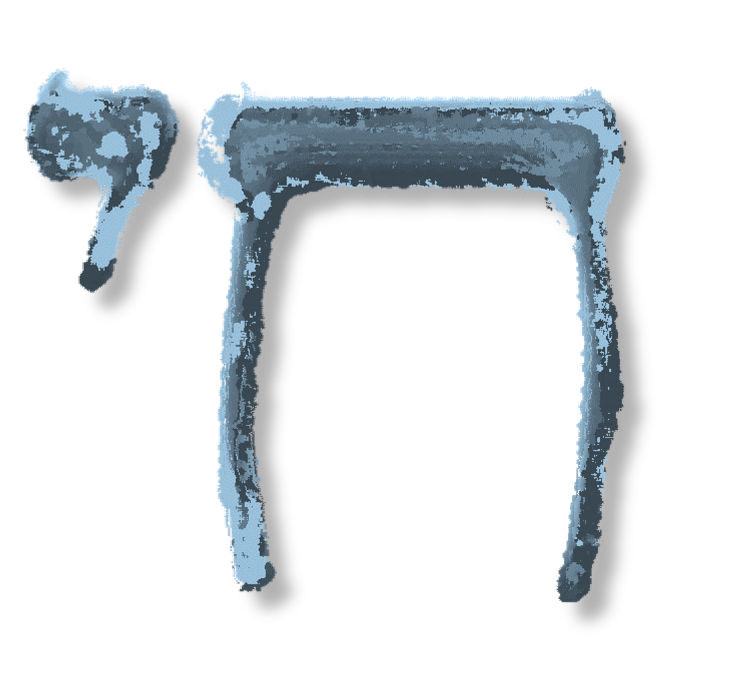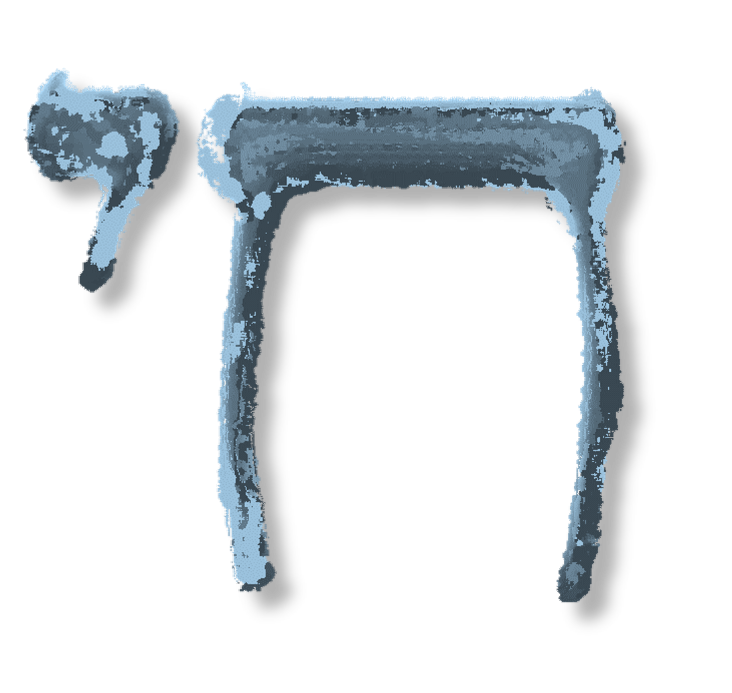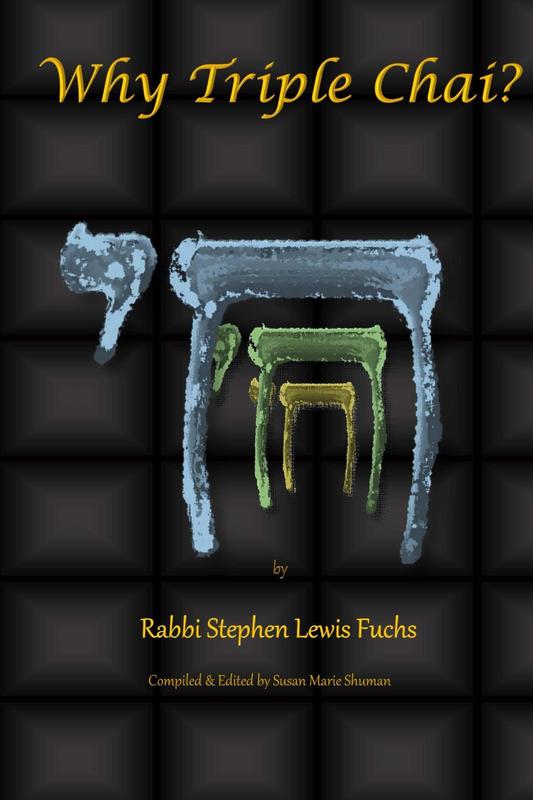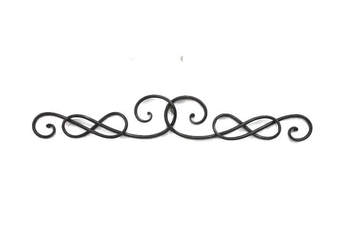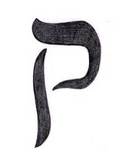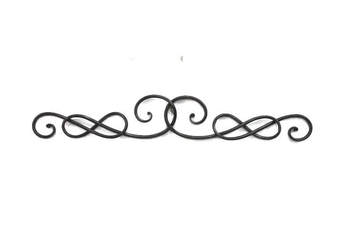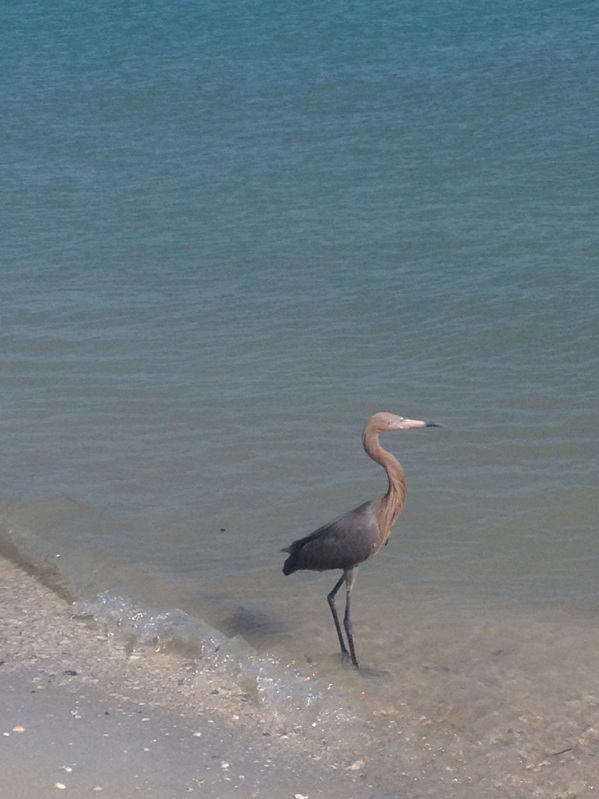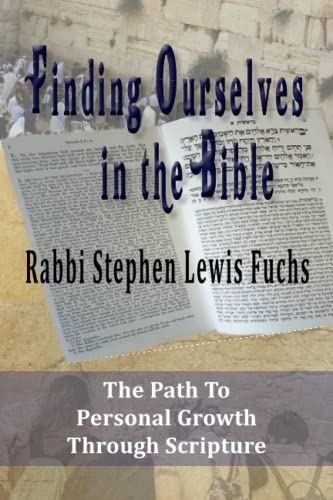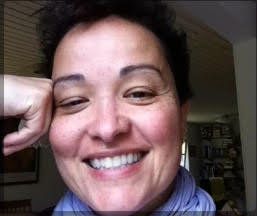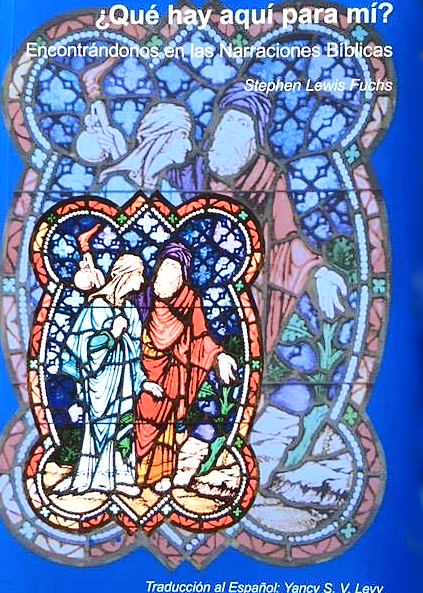Now Available from Amazon.com and Mazo Publishers!
Now Available at Amazon.com & Mazo Publishers!
Fuchs to Deliver Invocation; Share Father's
Story of Kristallnacht
The Jewish Federation of Sarasota-Manatee has invited Rabbi Stephen Fuchs, with the Bat Yam Temple of the Islands, to deliver in a pre-recorded video an invocation and a brief story of his father’s journey as a survivor of the Night of Broken Glass.
Kristalnacht or the Night of Broken Glass, also called the November Pogrom, was a pogrom against Jewish people and property throughout Nazi Germany on Nov. 9-10, 1938. The name comes from the shards of broken glass that littered the streets after windows of stores, buildings and synagogues were smashed. Thirty thousand Jewish men were beaten, arrested and incarcerated in concentration camps.
Fuchs’ father was one of 500 men rounded up and arrested in Leipzig and taken to the zoo. They were stood in a stream, where they were spat on, cursed and worse, before being taken in trains to the Dachau concentration camp. Historians view Kristalnacht as a prelude to the murder of 6 million Jews during the Holocaust.
“We gather together tonight in honor of God’s sacred command ‘Remember,'” Fuchs shared in his invocation. “Remember that night when precious scrolls were ripped from their arks, stomped beneath Nazi jackboots, remember how windows in homes, shops and synagogues were smashed … after that horrible night no one could doubt what Hitler’s purpose was, but we endure. Bless those survivors and we remember with gratitude and bless the righteous among non-Jews who put themselves in danger helping Jews to survive. With memory comes awesome responsibility — never to turn aside in the face of evil.”
He explained how we should always choose life — Fuchs exhorted us to do this when faced with a choice. He blessed the gathering and then talked of his personal story.
“I first learned of Kristalnacht when I was 22 years old from a professor of mine,” Fuchs said. “But I never knew my own father had been arrested on that night in Leipzig. It was only when I flew home to visit my ill father and heard him shouting in German, a language I had never heard him use, that I asked my uncle what dad is saying and I was told, ‘He is asking the guards to stop beating him.’ Years later, in 1982, I went to Leipzig, but entry was initially declined. It was only when I told the authorities I was an art teacher and wanted to visit Leipzig’s famous museum was I allowed entry.”
He remarked that the first glimpse of Leipzig was the train station; it was his father’s last glimpse as he was taken by train to Dachau. Fuchs immediately went to the zoo and stood on a bridge spanning the stream. There he had an imaginary conversation with his father — then he wept. The next day Fuchs visited a tiny Jewish records office, where he asked for his family’s record. He found out that at the peak of the Jewish population in Leipzig, there had been 18,000 Jews. Fourteen thousand out of that population died in the Holocaust. One-third of the Jews alive in Germany in 1935 were dead in 1945 because of Hitler. Two-thirds is the number of European Jews who died in the Holocaust, and three-fourths of that were rabbis, cantors, teachers — all professionals perished. Seven out of nine was the fate of the Jews in Leipzig.
Fuchs is well aware how fortunate his father was to have had relatives established in the United States who petitioned for his father’s entry into this country.
In 2014, Fuchs and his wife, Vickie, were invited to Leipzig, Germany, to speak on Nov. 9 at three Kristalnacht commemorations. One was at the stream at the zoo; another was at the previously great synagogue, which is now filled with empty chairs; and the third was at the St. Thomas Church (Thomaskirche) at a ceremony, which atoned for the horror and prayed for a better future. He and his wife have visited Germany each year for five years. They had to cancel this year because of the pandemic. There they both speak at schools and always say, “We cannot undo the past but the future is ours to shape.”
This is the message Fuchs will leave the Jewish Federation of Sarasota-Manatee: We should look to the past with our eyes on the future. We can do better if each of us does what he can to stand against evil and wrongdoing. We can move the world a little bit closer to the ideal expressed by the prophet Isaiah. The prophet Micah spoke of a time, “When violence will no longer be heard in our land and each of God’s children will be able to sit under their vine, their fig tree with none to make them afraid.”
By BAT YAM TEMPLE OF THE ISLANDS - | Oct 28, 2020
The Silver Lining in a Very Dark
Cloud
by
Rabbi Stephen Lewis Fuchs
Rabbi Stephen Lewis Fuchs
The staggering number of deaths around the country and the world, and the horrible suffering endured by so many has us reeling.
The world will never be the same.
No one should minimize the human and economic cost of the current pandemic. Loved ones, friends and untold number of others have died and will die. Staggering numbers of people have lost their jobs and means of sustaining themselves and their families. Too many people have died and will die without loved ones nearby to say goodbye or to attend their funerals.
The description of horror and upheaval are endless.
And yet…
Instead of trying to get back to the old normal, maybe we can embrace the silver lining in the very dark cloud passing over us and create a new and better normal for ourselves future generations.
What is that silver lining?
The earth in these short weeks of shutdown has made a remarkable ecological recovery. Water is cleaner, air is purer and the tide flowing toward inevitable environmental destruction has slowed.
What a vital warning this tragic time is reiterating. It is the same warning our Sages issued to us in the name of the Eternal One (Kohelet Rabbah, chapter 7) at the time of creation: “You are in charge of and responsible for this earth. But it is the only one you will get. So preserve and enhance it. Do not pollute or destroy it.”
Can we somehow embrace that valuable lesson before rushing headlong back to doing things exactly as we did before?
And speaking of rushing … is there nothing we can learn from the forced “slowing down” that has become the current reality of our lives?
I for one do not wish to return to a normal that fills every waking moment of every single day with responsibilities and obligations that make every pause and every deep breath we allow ourselves a guilty pleasure or a costly luxury.
As Queen Elizabeth so eloquently reminded us in her address to Great Britain and the world, might we embrace the beauty of aloneness and the time for self-reflection and meditation this time allows even after we can return to our previous routines?
Also, might we not — while forced to accept physical distance – give thanks for the virtual capabilities this crisis has enabled us to embrace?
Might the absolute necessity for physical distance inspire us to greater “social closeness” through emails texts, video chats, phone calls and letters?
For example, last year’s Bat Yam Temple of the islands Seder found more than 150 people straining the fire code limits of the Sanibel House, and it was wonderful to be together. Hopefully, we shall be again next year.
But should we not give thanks that while this year’s Seder found just a few close family members together in a room, our ritual was enjoyed by people not only from as close as Sanibel and Fort Myers but from as far away as Hawaii and Germany as well.
I believe that the secret to Jewish survival despite all the hardships and tragedy history has imposed on us is our ability to cling to the hope that things will get better.
The national anthem of Israel, unlike those of many nations, is not a militaristic march, but a soulful melody entitled Ha-Tikvah, “The Hope.”
And so in the presence of the dark cloud hovering over us, I cling to the silver lining of this hope: When the cloud passes over, and it will, may we learn the lessons it teaches and create a calmer, gentler world around us and within ourselves.
The world will never be the same.
No one should minimize the human and economic cost of the current pandemic. Loved ones, friends and untold number of others have died and will die. Staggering numbers of people have lost their jobs and means of sustaining themselves and their families. Too many people have died and will die without loved ones nearby to say goodbye or to attend their funerals.
The description of horror and upheaval are endless.
And yet…
Instead of trying to get back to the old normal, maybe we can embrace the silver lining in the very dark cloud passing over us and create a new and better normal for ourselves future generations.
What is that silver lining?
The earth in these short weeks of shutdown has made a remarkable ecological recovery. Water is cleaner, air is purer and the tide flowing toward inevitable environmental destruction has slowed.
What a vital warning this tragic time is reiterating. It is the same warning our Sages issued to us in the name of the Eternal One (Kohelet Rabbah, chapter 7) at the time of creation: “You are in charge of and responsible for this earth. But it is the only one you will get. So preserve and enhance it. Do not pollute or destroy it.”
Can we somehow embrace that valuable lesson before rushing headlong back to doing things exactly as we did before?
And speaking of rushing … is there nothing we can learn from the forced “slowing down” that has become the current reality of our lives?
I for one do not wish to return to a normal that fills every waking moment of every single day with responsibilities and obligations that make every pause and every deep breath we allow ourselves a guilty pleasure or a costly luxury.
As Queen Elizabeth so eloquently reminded us in her address to Great Britain and the world, might we embrace the beauty of aloneness and the time for self-reflection and meditation this time allows even after we can return to our previous routines?
Also, might we not — while forced to accept physical distance – give thanks for the virtual capabilities this crisis has enabled us to embrace?
Might the absolute necessity for physical distance inspire us to greater “social closeness” through emails texts, video chats, phone calls and letters?
For example, last year’s Bat Yam Temple of the islands Seder found more than 150 people straining the fire code limits of the Sanibel House, and it was wonderful to be together. Hopefully, we shall be again next year.
But should we not give thanks that while this year’s Seder found just a few close family members together in a room, our ritual was enjoyed by people not only from as close as Sanibel and Fort Myers but from as far away as Hawaii and Germany as well.
I believe that the secret to Jewish survival despite all the hardships and tragedy history has imposed on us is our ability to cling to the hope that things will get better.
The national anthem of Israel, unlike those of many nations, is not a militaristic march, but a soulful melody entitled Ha-Tikvah, “The Hope.”
And so in the presence of the dark cloud hovering over us, I cling to the silver lining of this hope: When the cloud passes over, and it will, may we learn the lessons it teaches and create a calmer, gentler world around us and within ourselves.
It's Here!
"Why Triple Chai?"
Available NOW at amazon.com in both paperback and Kindle formats.
Do you know Why Triple Chai?
Get your copy today & find out!
A Night to Remember:
Sanibel Rabbi Receives 'Rare Honor' From
Vanderbilt
Birmingham, AL, October 18, 2017– Last night, Rabbi Stephen Lewis Fuchs was officially named Distinguished Alumnus of 2017 by Vanderbilt Divinity School in Nashville, TN. Rabbi Fuchs, DMin’92, is the first Jew in the history of VDS to receive this award.
To be considered for the Distinguished Alumnus Award, one must demonstrate excellence and distinction in justice-making through their work in congregational ministry, religious institutions, ecumenical organizations, community–based organizations, government or other social institutions.
“I am humbled and proud that Vanderbilt Divinity School has recognized me in this way, particularly since I have learned that it is rare for a Christian Divinity School to recognize a Jew in this fashion.”
Rabbi Stephen Fuchs assumed the pulpit at Bat Yam Temple of the Islands in September. He is also rabbi emeritus at Congregation Beth Israel, has been a strong advocate for universal health care, playing a significant role in the passage of legislation for access to quality, affordable health care in Connecticut. He is a former president of the World Union for Progressive Judaism. During his extensive travels, Fuchs and his wife, Victoria, have visited many churches and schools in Germany to help educate young people about the significance of the Holocaust. His overarching message to the German students is this:
“Wir können die Vergangenheit nicht ungeschehen machen ...”
“We cannot undue the past, but the future is ours to shape.”
The rabbi is the author of four books: The first book, What’s in It for Me? Finding Ourselves in Biblical Narratives, is based on his Vanderbilt doctoral dissertation and has been translated into German, Russian and Spanish. Additional publications include ToraHighlights; Why the Kof? Getting the Best of Rabbi Fuchs, a collection of his essays and blog posts, and Why Triple Chai?
The award dinner and ceremony was held on Tuesday, October 17 at the University Club of Nashville.
Birmingham, AL, October 18, 2017– Last night, Rabbi Stephen Lewis Fuchs was officially named Distinguished Alumnus of 2017 by Vanderbilt Divinity School in Nashville, TN. Rabbi Fuchs, DMin’92, is the first Jew in the history of VDS to receive this award.
To be considered for the Distinguished Alumnus Award, one must demonstrate excellence and distinction in justice-making through their work in congregational ministry, religious institutions, ecumenical organizations, community–based organizations, government or other social institutions.
“I am humbled and proud that Vanderbilt Divinity School has recognized me in this way, particularly since I have learned that it is rare for a Christian Divinity School to recognize a Jew in this fashion.”
Rabbi Stephen Fuchs assumed the pulpit at Bat Yam Temple of the Islands in September. He is also rabbi emeritus at Congregation Beth Israel, has been a strong advocate for universal health care, playing a significant role in the passage of legislation for access to quality, affordable health care in Connecticut. He is a former president of the World Union for Progressive Judaism. During his extensive travels, Fuchs and his wife, Victoria, have visited many churches and schools in Germany to help educate young people about the significance of the Holocaust. His overarching message to the German students is this:
“Wir können die Vergangenheit nicht ungeschehen machen ...”
“We cannot undue the past, but the future is ours to shape.”
The rabbi is the author of four books: The first book, What’s in It for Me? Finding Ourselves in Biblical Narratives, is based on his Vanderbilt doctoral dissertation and has been translated into German, Russian and Spanish. Additional publications include ToraHighlights; Why the Kof? Getting the Best of Rabbi Fuchs, a collection of his essays and blog posts, and Why Triple Chai?
The award dinner and ceremony was held on Tuesday, October 17 at the University Club of Nashville.
Rabbi Stephen Lewis Fuchs
Named
Vanderbilt Divinity School's 2017
Distinguished Alumnus of the Year
A senior rabbi who has worked tirelessly to promote racial and religious affirmation and respect while inspiring compassion, along with a national leader in the environmental and conservation communities, are the 2017 Vanderbilt Divinity School and Graduate Department of Religion Distinguished Alumni/ae
Rabbi Stephen Lewis Fuchs, DMin’92
Stephen Lewis Fuchs, DMin’92, who led The Temple Congregation Ohabai Sholom in Nashville for 11 years, and the late Rev. Chandra Taylor Smith, BA’83, PhD’01, who was vice president for diversity and inclusion at the National Audubon Society, will be honored at a Vanderbilt Divinity School celebration dinner Oct. 17. Smith’s husband, Bennie Smith, JD’95, a graduate of Vanderbilt Law School, will attend and accept the award on her behalf.
“Each year I find myself heartened and proud of the tremendous witness of our alumni/ae,” said Emilie M. Townes, dean of Vanderbilt Divinity School and the E. Rhodes and Leona B. Carpenter Professor of Womanist Ethics and Society. “Rabbi Fuchs and the Rev. Taylor Smith stand in this line of faithful folk who have lived out their religious convictions in such a way that lives are changed and the world becomes a better place.”
The Divinity School award is given to someone who has demonstrated excellence and distinction in justice-making through their work in congregational ministry, religious institutions, ecumenical organizations, community–based organizations, government or other social institutions.
Fuchs earned his doctor of ministry in biblical interpretation from the Divinity School in 1992. The graduate of Hamilton College was ordained a rabbi at Hebrew Union College-Jewish Institute of Religion. There he also received a bachelor and a master of arts in Hebrew letters, as well as a graduate certificate in Jewish communal studies. He was awarded an honorary doctor of divinity from HUC-JIR in 1999.
Fuchs served synagogues in Columbia, Maryland, and in Nashville before moving to Congregation Beth Israel in West Hartford, Connecticut, where he was senior rabbi from 1997 to 2011. Under his leadership one of the largest food drives of its kind in the United States was launched.
Fuchs, who is now rabbi emeritus at Congregation Beth Israel, has been a strong advocate for universal health care, playing a significant role in the passage of legislation for access to quality, affordable health care in Connecticut. He also has spoken out against violence in sports and the media. He is a former president of the World Union for Progressive Judaism. During his extensive travels, Fuchs has visited many churches and schools in Germany to help educate young people about the significance of the Holocaust.
Fuchs is the author of three books: What’s in It for Me? Finding Ourselves in Biblical Narratives; ToraHighlights; and Why the Kof? Getting the Best of Rabbi Fuchs, a collection of his essays and blog posts.
Rabbi Stephen Lewis Fuchs, DMin’92
Stephen Lewis Fuchs, DMin’92, who led The Temple Congregation Ohabai Sholom in Nashville for 11 years, and the late Rev. Chandra Taylor Smith, BA’83, PhD’01, who was vice president for diversity and inclusion at the National Audubon Society, will be honored at a Vanderbilt Divinity School celebration dinner Oct. 17. Smith’s husband, Bennie Smith, JD’95, a graduate of Vanderbilt Law School, will attend and accept the award on her behalf.
“Each year I find myself heartened and proud of the tremendous witness of our alumni/ae,” said Emilie M. Townes, dean of Vanderbilt Divinity School and the E. Rhodes and Leona B. Carpenter Professor of Womanist Ethics and Society. “Rabbi Fuchs and the Rev. Taylor Smith stand in this line of faithful folk who have lived out their religious convictions in such a way that lives are changed and the world becomes a better place.”
The Divinity School award is given to someone who has demonstrated excellence and distinction in justice-making through their work in congregational ministry, religious institutions, ecumenical organizations, community–based organizations, government or other social institutions.
Fuchs earned his doctor of ministry in biblical interpretation from the Divinity School in 1992. The graduate of Hamilton College was ordained a rabbi at Hebrew Union College-Jewish Institute of Religion. There he also received a bachelor and a master of arts in Hebrew letters, as well as a graduate certificate in Jewish communal studies. He was awarded an honorary doctor of divinity from HUC-JIR in 1999.
Fuchs served synagogues in Columbia, Maryland, and in Nashville before moving to Congregation Beth Israel in West Hartford, Connecticut, where he was senior rabbi from 1997 to 2011. Under his leadership one of the largest food drives of its kind in the United States was launched.
Fuchs, who is now rabbi emeritus at Congregation Beth Israel, has been a strong advocate for universal health care, playing a significant role in the passage of legislation for access to quality, affordable health care in Connecticut. He also has spoken out against violence in sports and the media. He is a former president of the World Union for Progressive Judaism. During his extensive travels, Fuchs has visited many churches and schools in Germany to help educate young people about the significance of the Holocaust.
Fuchs is the author of three books: What’s in It for Me? Finding Ourselves in Biblical Narratives; ToraHighlights; and Why the Kof? Getting the Best of Rabbi Fuchs, a collection of his essays and blog posts.
To Sanibel Island, With Love
|
Rabbi Stephen Fuchs has accepted a seasonal position at Bat Yam, Temple of the Islands. Visit our Media Page for details! |
Rabbi Fuchs first book, Finding Ourselves in the Bible, is available at Amazon.com!
In German! |
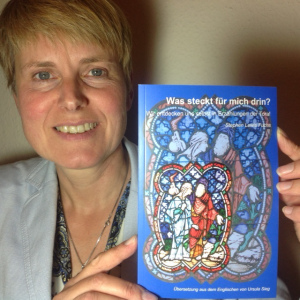
|
Pastorin Ursula Sieg undertook the translation andpublication of a German edition of my book, What’s in It for Me? Finding Ourselves in Biblical Narratives. In order to bring this project to fruition, Pastorin Sieg enlisted the expert editorial skills of Dr. Serafine Kratzke and established a publishing house that she named “Mutual Blessing Edition.” Pastorin Sieg’s passion for creating greater inter-religious harmony and her belief in the value of What’s in It for Me? inspired her to put many months of effort into the publication. |
In Russian!
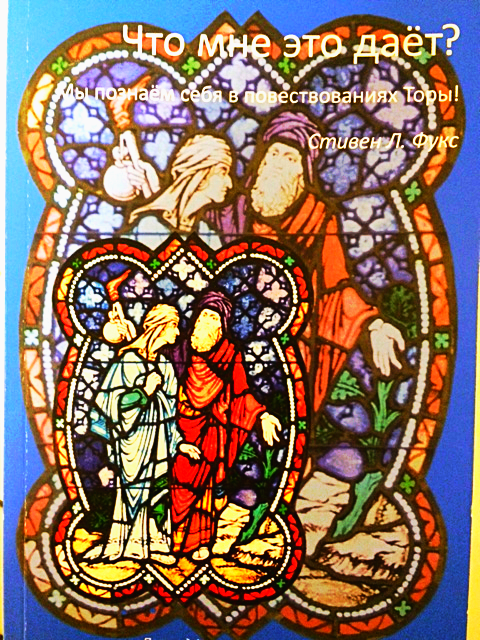
And now, What's in it for Me? Finding Ourselves in Biblical Narratives is also available in Russian! The translation was prepared by Alexandra Oks, and I am most grateful to her. I also gratefully thank Dr. Serafine Christine Kratzke for her skillful work on the layout of the book.
But wait! There's more!
We are pleased to announce that Yancy V. Levy (I cannot thank her enough) has completed the Spanish translation of "What's in It for Me? Finding Ourselves in Biblical Narratives." Three years ago when the book first came out, I did not imagine that it would become available in German, Russian and soon (watch this space for release date) in Spanish.
Many thanks to Pastor Ursula Sieg and her company, Mutual Blessing Edition for making this possible!
Many thanks to Pastor Ursula Sieg and her company, Mutual Blessing Edition for making this possible!
About Yancy V. Levy
I am a Venezuelan Jew living in northern Germany. The story of my family is a diverse narration of hidden Jews, spices, and travel. A story of interaction and reinvention and avid readers.
By profession I am a scientist. I am also a mother, now in a prolonged sabbatical raising my two kids. They believe I'm sort of a nature lover, hippie soul deeply rooted in evolution. I'm also a passionate reader, and had the benefit bilingual upbringing — Spanish and English.
Reading is an essential part of my life not only professionally, but also as a Jew and as a woman. Reading has opened a fantastic universe for me with sources not only in English and Spanish but also in Danish and German. I believe reading for pleasure as well as for study can make the world a better place.
I met Rabbi Fuchs about two years ago. What impressed me the most was his charisma, and his determination to replace the walls that divide Christians, Jews and Muslims with bridges of understanding and acceptance. His dedicated Interfaith dialogue made me think about my family and fellow Jews who are maligned due to a lack of understanding on the part of their non-Jewish neighbors. At the same time, it is also the responsibility of Jewish people to foster mutual understanding by allowing those bridges to be built.
Oftentimes, well-intentioned friends seem to consider me part of a "subculture" in which superiority or inferiority are key.
Fortunately, Rabbi Fuchs brings to us a fantastic little book that is easy to read, available to all, and shatters those "walls". We need more of that, for our kids and their kids.
“What’s in it for Me? Finding Ourselves in Biblical Narratives,” was my first attempt at translating an entire book.
Previously, I had done some short translations on my own but nothing like this. Last Rosh Hashanah, Rabbi Fuchs expressed his hope to see his book translated into Spanish. So, I took the chance because I know and love the Spanish language, and have read from the Classics to the Contemporary writers. I know there are many readers out there who would enjoy and benefit from this book. It was a leap of faith, but it was worth it for my kids and my non-Jewish Latino friends. In a sense, translating the rabbi’s book was my personal act of Tikkun Olam (repairing the world), for in healing the wounds and building bridges of tolerance and respect, we help to heal the world.
Even the smallest acts are worthwhile.
In Spanish!
It's here! The Spanish version of What's in it For Me? Finding Ourselves in Biblical Narratives is now available for purchase at Amazon.com. Be sure to order yours today because they're flying off the shelves. Thank you, Yancy S. V. Levy!
The Arrival of ToraHighlights!
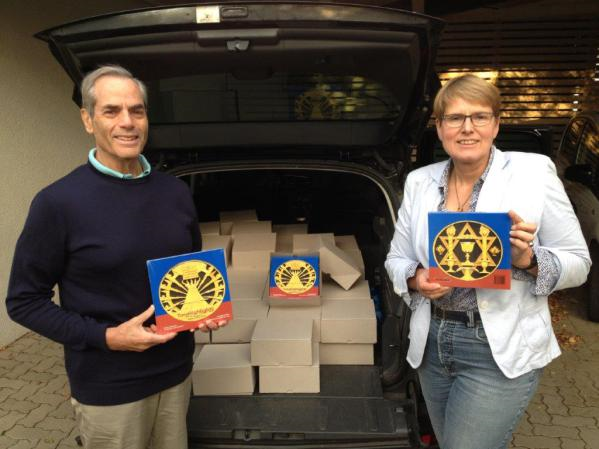
ToraHighlights: On the eve of the New Year translator and CEO of Mutual Blessing Edition, Pastorin Ursula Sieg and I welcome with gratitude the first shipment of my new book ToraHighlights. We pray that the short commentaries it contains on each weekly Torah portion will bring insight and blessings to many people in the New Year. Get your copy of ToraHighlights at Amazon.com.
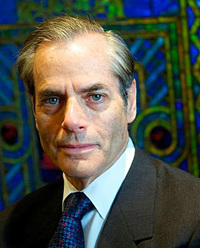
Repeatedly in the Bible, it is the woman who 'gets it' and the man who is clueless. Eve has been maligned for generations for the supposed fall of man, when in fact; she is the heroine of the elevation of humanity. ~
"Women (Em)Power" from "Why the Kof? Getting the Best of Rabbi Fuchs."
"Women (Em)Power" from "Why the Kof? Getting the Best of Rabbi Fuchs."
